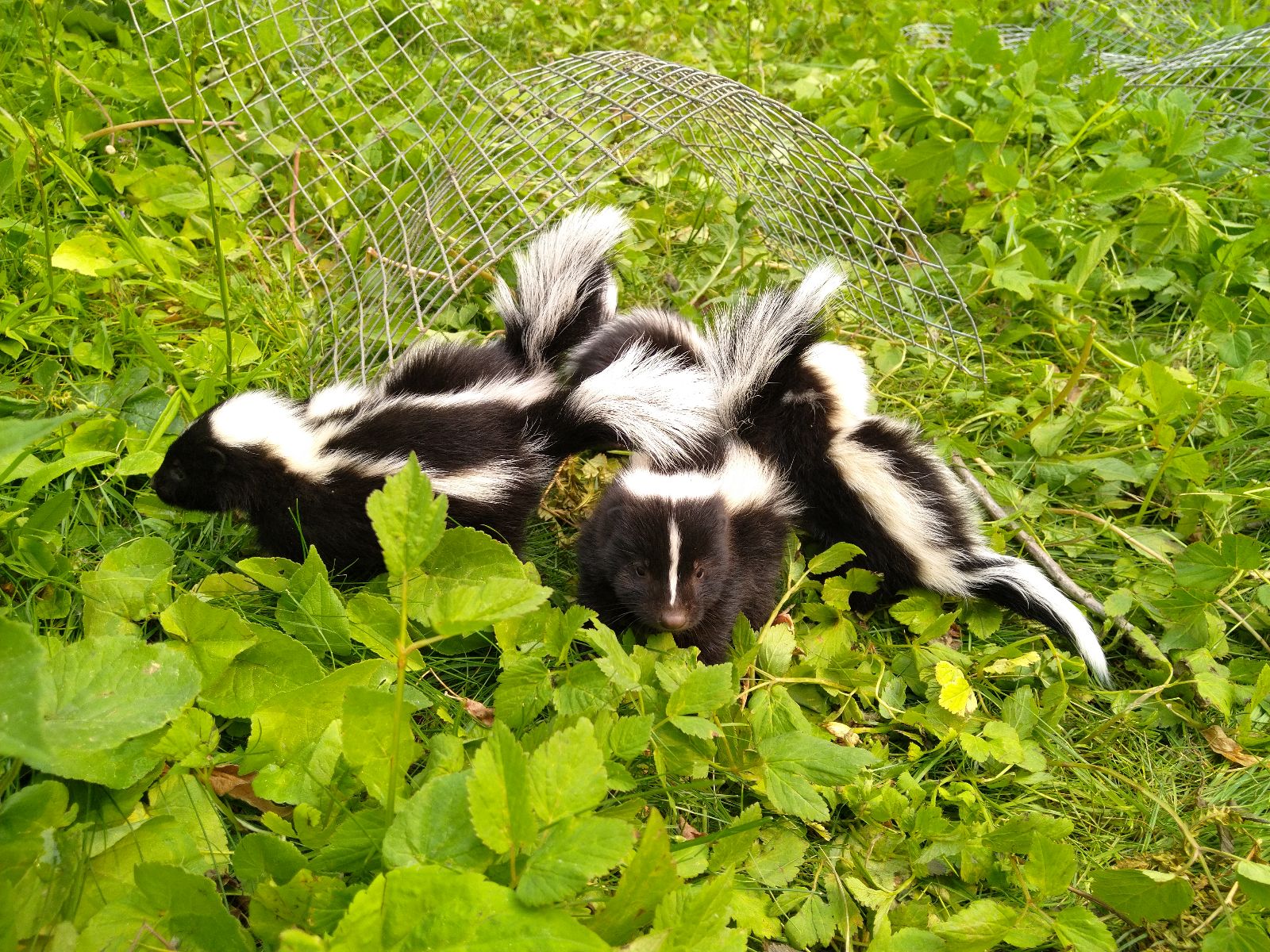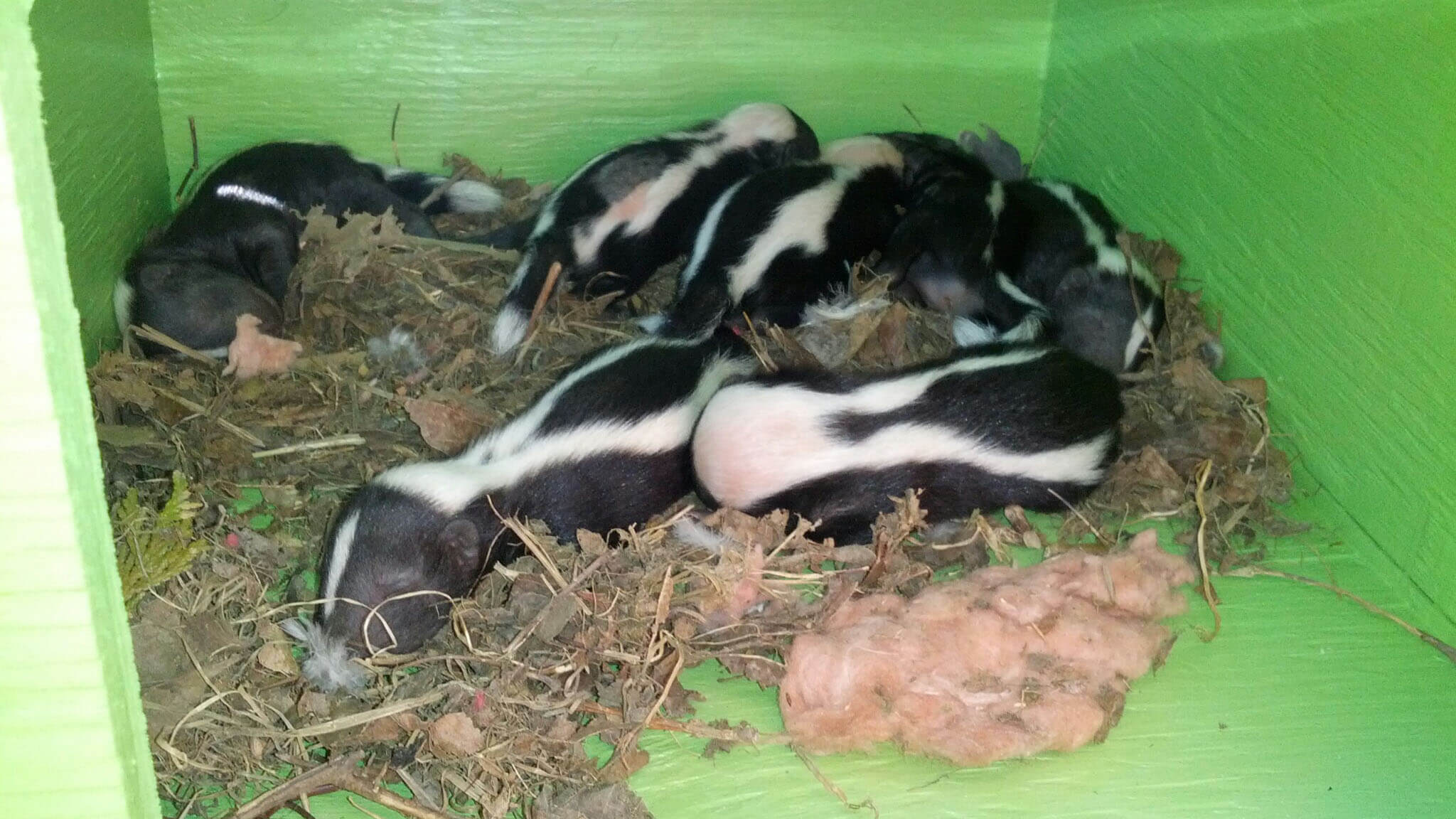SKUNK REMOVAL PROCESS
Assess and Remove
To solve a skunk problem, we start with a complete assessment of your property to determine where the skunks are living and how they’re gaining access. Since skunks do not climb our inspection will focus on the ground level den sites like porches, decks and sheds. We then perform a careful and humane removal, including any babies.
Clear and Clean
Once we humanely remove any skunks and their babies we will move on to clearing the den site of any damaged property, nesting material or debris that was gathered by the animals. We can then begin cleaning, disinfecting and deodorizing the area to eliminate any risk of illness, irritating odors and attractants for other wildlife.
Prevent and Protect
To prevent a future skunk problem, our technicians will get to work installing protective barriers designed to keep skunks out. This usually involves digging out around the perimeter of the deck, shed or porch and burying a heavy steel mesh deep into the ground. Our workmanship and materials are backed by a lifetime warranty.
Skunk Removal in Calvert County
Calvert County is a place of serene beauty with ample green space, making it an ideal living destination for many. However, all this greenery comes with its fair share of wildlife, bringing the occasional challenge of dealing with animals like skunks.
While they may have a cute appearance, skunks can be a nuisance for homeowners as they love to venture onto properties in search of food and shelter. It’s important to be aware of the potential presence of skunks in your home and take adequate measures to keep them at bay. By taking some extra precautions, you can coexist peacefully with the wildlife in Calvert County. However, if you find that skunks have taken up residence on your property, contact Skedaddle for skunk removal in Calvert County today!
A Serene Experience
Living in Calvert County can be a beautiful experience due to its lush, green surroundings. But with all the natural beauty come some challenges, and one of the most significant issues residents face is dealing with skunks. These animals are notorious for their potent odor and ability to spray when provoked, making them quite a hassle to deal with.
There are several methods for controlling skunk populations, such as trapping or repellents, but it takes some knowledge and patience to handle them safely and ethically. This is why it is vital to hire professionals for the job. With the right tools and understanding, residents of Calvert County can navigate this challenge and continue to enjoy the tranquil surroundings.

Skunks: Interesting And Intimidating
Having skunks wander around in your yard can be both interesting and intimidating, but having them move into your home can be a different story. There are a few reasons why skunks might find our homes comfortable, including being attracted to food waste, seeking shelter, or establishing their den.
Keeping your property clean and free of food debris is essential to avoid drawing in these creatures. Additionally, sealing off all possible entrances, such as crawl spaces or gaps in the foundation, can help prevent skunks from entering the home. Paying attention to your home’s surroundings can go a long way toward keeping skunks at bay, and if you still encounter an infestation, it’s best to contact Skedaddle for skunk removal in Calvert County.
How To Get Rid Of Skunks
When it comes to dealing with a skunk infestation, it’s important to think about the most humane and practical way to handle the situation. That’s where Skedaddle humane wildlife removal services can come in to help.
Skunks can infest properties and leave a strong and unpleasant odor, making them difficult to deal with on your own. Our trained wildlife professionals have the expertise to safely and humanely remove skunks from your property. We offer various techniques and methods designed to not only get rid of the skunks but also ensure that they don’t return.
We focus on humane, non-lethal removal, which sets us apart and gives peace of mind to those dealing with a skunk infestation. Trust Skedaddle to help rid your property of skunks in the most effective and mindful way possible.
Get started today with skunk removal in Calvert County!
Skunk Facts
FACT:
Skunks are immune to the venom of many snakes, including rattlesnakes and copperheads. They’re known to eat these snakes, making them a valuable asset to farmers and gardeners who want to keep snake populations under control.
FACT:
Skunks are one of the few animals that can carry and transmit rabies, making it important to avoid contact with them. However, skunks are also less likely to contract rabies than other animals like raccoons or bats, which may be due to their solitary nature and slower movement.
FACT:
Skunks have an excellent sense of smell, but their eyesight is poor, and they’re nearsighted. They rely on their sense of smell to locate food and identify predators, as well as to communicate with other skunks through scent marking.
FACT:
Skunks have a unique defense mechanism in the form of their infamous spray, which is made up of sulfur-containing chemicals that produce a pungent odor and can cause temporary blindness and nausea. They can spray up to 10 feet away and aim with impressive accuracy, making it difficult for predators to get close.
FACT:
Some species of skunks, like the hog-nosed skunk, are able to perform a convincing death-feigning behavior when threatened. They’ll roll onto their back, expose their teeth and tongue, and emit a foul-smelling liquid from their anal glands. This behavior is an effective deterrent for predators like birds of prey that prefer live prey.

CHECK OUT OUR LATEST BLOGS
Chesapeake Beach Wildlife Control: Bat Damage Risks and How to Prevent It
Prince Frederick Wildlife Control: Dangers of Bats Living on Your Property
Calvert County Wildlife Control: Debunking Common Myths about Bats in Winter





